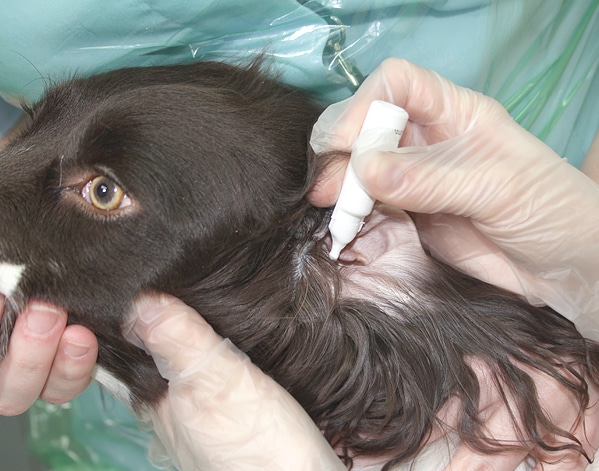
What are ‘steroids’?
Steroids are hormones which are naturally found in the body and which are produced by small organs in the tummy (abdomen) called the adrenal glands. Steroids, such as cortisone, have a huge number of functions in all the cells of the body – they are required for life. In addition to being naturally produced in the body, steroids can be used as a medicine for many conditions.
How and why are steroids used?
Steroids have a potent anti-inflammatory effect and are often used to reduce inflammation. An example of this includes the treatment of allergic conditions in dogs and cats such as flea allergy dermatitis (skin inflammation and itchiness), asthma-like diseases, food allergies and bee stings.
Steroids can also suppress the immune system. The immune system normally fights infections, but in some conditions the immune system becomes overactive and starts to attack the normal tissues of the body – this is called ‘immune-mediated disease’. Examples of immune-mediate disease include:
- Immune-mediated haemolytic anaemia (damage to the red blood cells)
- Immune-mediated thrombocytopaenia (damage to small cells in the blood called platelets, which help the blood to clot)
- Immune-mediated polyarthritis (damage affecting the joints)
- Meningitis (damage to the brain)
- Glomerulonephritis (damage to the kidneys)
- Inflammatory bowel disease (damage involving the stomach and intestines)
In these conditions, steroids are given to dampen the overactive immune system response and stop the destruction of normal healthy cells. Steroids can also be effective in stopping or slowing the rate of growth of some, but not all, cancers.
Steroids have a wide range of effects, and can be used for a broad spectrum of diseases, ranging from the minor to serious life-threatening problems. Different doses and regimes of steroid use are required to treat different conditions.
What are the possible side effects of steroid treatment?
Steroids are one of the most effective drugs to treat immune-mediated and inflammatory diseases. However, there are some side effects that your vet will try to minimise. These range from being merely somewhat troublesome, through to some which are potentially very significant. The degree of side effects tends to be related to the dose used, but some individuals are more susceptible to side effects than others.
Possible side effects include:
- Potentially dramatic increases in thirst, hunger, and urine volume. Some dogs will become incontinent due to the volume of urine produced.
- Panting
- Muscle weakness
- Lethargy
- Hair loss over the trunk, or slow re-growth after clipping
- Pot-bellied appearance
All of these steroid-induced side effects are reversible and diminish when the dose of steroid is decreased or stopped.
Other side effects which your vet will be on the lookout for include the increased risk of infection (due to suppression of the immune system), stomach ulcers, blood clots and diabetes (particularly in cats). In some dogs and cats, determining the appropriate dosage of steroids can be challenging, and it can be difficult to ensure that the right amount of medication is given to control the disease without having significant side effects. Sometimes we need to use other drugs to compliment the use of steroids, allowing us to reduce the steroid dose whilst still controlling the disease.
Tapering the dose of steroids
When we give steroids, the body becomes used to the amount that we are giving, and the body reacts by reducing the production of its own natural steroids.
When the use of steroids can be reduced or stopped, we generally recommend ‘tapering’ the dosage so that the body can gradually resume its own, normal levels of steroid production – a rapid withdrawal of steroid treatment can result in the patient suddenly not having sufficient steroid in the circulation. It is very important that you follow the instructions you are given about the tapering process, as taking away the steroids too quickly can be life-threatening.
Handling steroid tablets
It is sensible to wash your hands after handling any drugs, including steroids. However, you should avoid handling steroids if you are pregnant or suspect that you may be pregnant.
Outcome and benefits of steroid use
Steroids are very effective drugs, and in many cases are life-saving. Side effects are common, but are generally worth tolerating, especially given the potential benefits of their use.
If you have any queries or concerns about the use of steroids in your pet, please do not hesitate to contact us.
© Copyright North Downs Specialist Referrals
Arranging a referral for your pet
If you would like to refer your pet to see one of our Specialists please visit our Arranging a Referral page.